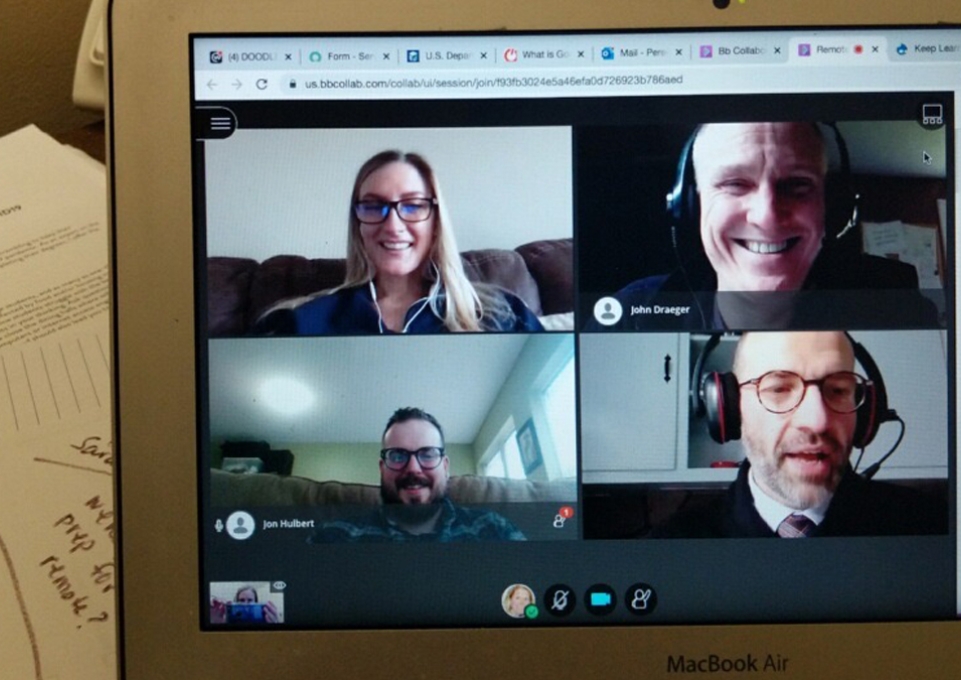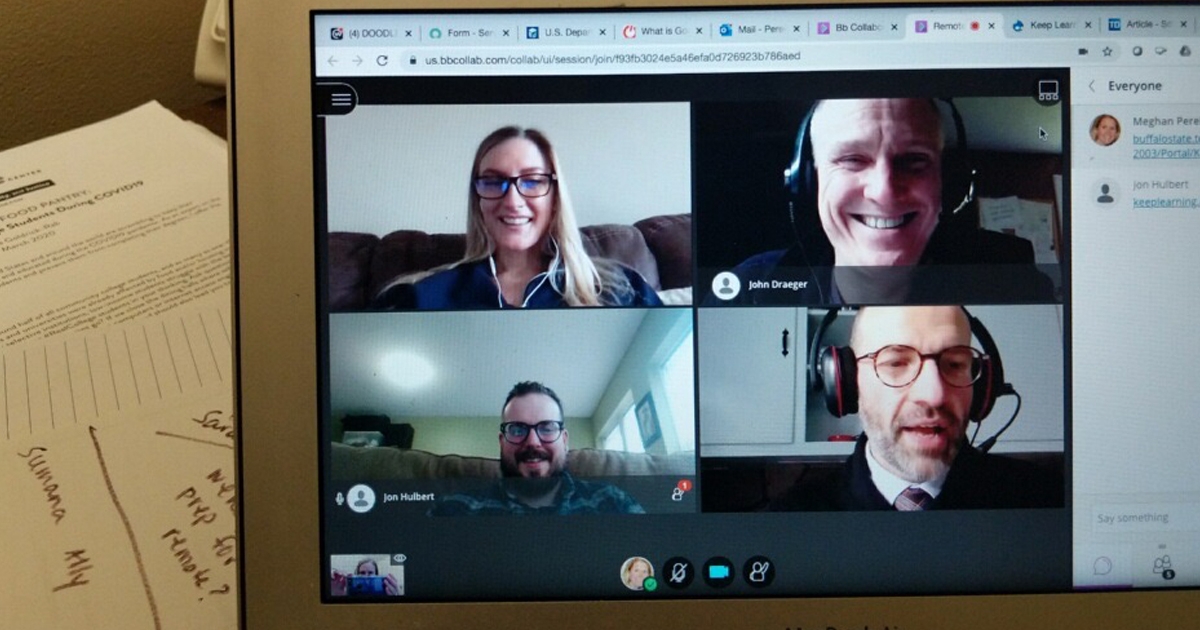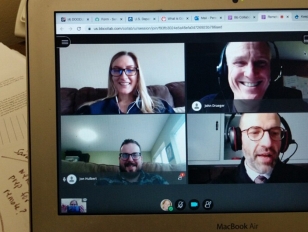
Over the past two weeks, as Buffalo State College faculty members geared up for the switch to remote instruction due to COVID-19, staff members in three areas have worked diligently to offer numerous workshops and trainings to prepare for the March 30 launch.
Almost 170 faculty members took advantage of training sessions offered by Instructional Design and Training (IDT) and the Teaching and Learning Center (TLC), while additional faculty and staff members participated in Professional Development Center (PDC) trainings, according to Meghan Pereira, director of IDT.
“It’s amazing how little grumbling we’ve heard and how hard faculty are working on making this transition,” said John Draeger, professor of philosophy and director of the TLC. “They don’t want to let their students down.”
In addition, faculty members adept at remote instruction have stepped up to help colleagues who aren’t as familiar with online learning. Some faculty members have never used Blackboard, the web-based server software that allows for course management and instruction, or other online technology tools for the classroom; however, they are quickly getting up to speed.
“We’ve heard from many faculty members who are helping others,” Draeger said.
For instance, Sue McMillen, professor of mathematics, agreed to be the point person for her department and has been assisting her colleagues with specific issues.
“Sometimes, it’s easier when faculty members can turn to one of their own for questions and feel like they have an advocate,” Pereira said.
In the Music Department, Evan Drummond, a lecturer and instructor of guitar, has been working one on one with at least three faculty members unfamiliar with Blackboard, said Victoria Furby, associate professor and department chair. He taught them how to create Blackboard courses, upload videos, and set up gradebooks, among other tasks.
“Evan has managed to help these folks deliver great online instruction,” Furby said. “His contributions have been tremendous and invaluable.”
Draeger pointed to a handful of other faculty members across campus who have been especially helpful during the transition. They include Carol DeNysschen, professor and chair of the Health, Nutrition, and Dietetics Department; Katrina Fulcher, assistant professor of speech-language pathology; Andrea Nikischer, associate professor of adult education; and Pamela Schuetze, professor of psychology.
“I feel fortunate to be able to help faculty through a sudden and unexpected transition in teaching modality,” DeNysschen said. “I applaud every faculty member who is taking advantage of the wonderful features of Blackboard, the expertise of IDT staff, and the collaboration with the Teaching and Learning Center. I learned from the best and am happy to pass my knowledge along to other faculty.”
Schuetze said she was glad to volunteer when Draeger asked faculty for help.
“I completed training in teaching online courses a couple of years ago,” she said. “I’m so grateful that I had those skills and recognize that I’m feeling considerably less anxious because of those skills. It’s the least I can do to help support fellow faculty as they work on transitioning their courses to an online format.”
Because the adult education program is already offered 100 percent online, its faculty members reached out to help faculty in other programs and departments, Nikischer said.
“I’ve worked with several faculty members from across campus through webinar trainings, and they all share a similar concern: that their students are safe, healthy, and have the technology required to continue to learn,” Nikischer said. “With such a major change in faculty work requirements, one might imagine that faculty would worry about their own workload, yet all of the faculty I’ve worked with are completely focused on the needs of their students.”
Fulcher, who has been teaching colleagues how to do screen casting and recording, to create voice-over for PowerPoint lectures, and to modify lectures to best optimize student attention and engagement, also noted how faculty members are keeping their students’ needs in the forefront.
“On the whole, people have been warm, positive, upbeat, and just wanting to jump in and try their best,” Fulcher said. “I think we’re so lucky to have individuals like Meghan Pereira, Brooke Winckelmann, John Draeger, and Todd Benzin on our campus, who have mobilized us and gotten us ready in such a small amount of time.”
Schuetze said she’s been encouraged by the way in which faculty members have come together to support one another.
“Although this crisis has highlighted the disparities faculty members have in the knowledge and comfort in using technology to teach,” Schuetze said, “I think that the sense of community I have seen over the past few weeks will help us to navigate these changes with relatively few glitches.”
As the campus eases into remote instruction, trainings will continue, Pereira said.
Her group sent a survey to faculty members who attended previous sessions, asking which additional areas they need assistance with; those responses will inspire upcoming training sessions. She said workshops will continue to be added to the Workshop Registration System.
Pictured clockwise from top left: Brooke Winckelmann, John Draeger, Todd Benzin, and Jonathan Hulbert.



